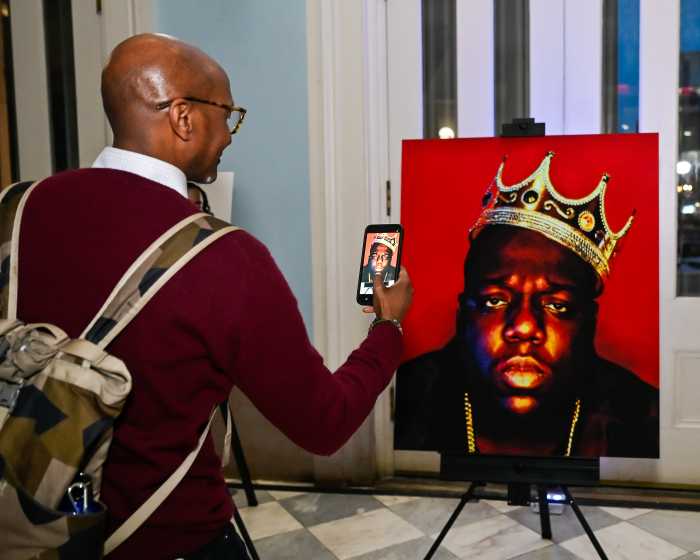BY ARTHUR S. LEONARD | For the second time in recent months, the Justice Department has filed a brief with a federal court arguing that a US law on candidate Barack Obama's hit list is in fact constitutional.
Several months ago, it was the Solicitor General's Office that argued in a brief to the Supreme Court that the military’s Don’t Ask, Don’t policy was constitutional –– and therefore a petition to be heard filed by James Pietrangelo, one of the plaintiffs in a 1st Circuit Court of Appeals case out of Boston challenging the policy, should be denied. Last week, the Court did just that, without explanation.
Now, on June 11, a different branch of the Justice Department, the Civil Division, filed a motion and brief with the US District Court for the Central District of California, urging dismissal of Smelt v. United States challenging the constitutionality of the Defense of Marriage Act (DOMA). The case was initially brought in state court and removed by the government to federal court.
The Justice Department argues that DOMA, a statute that last year Obama ran pledging to repeal, is constitutional and, incredibly, asserts it does not discriminate against gay people, even though the statute says same-sex marriages are a nullity in the eyes of the federal government and need not be recognized by any state. Furthermore, and absurdly, the brief argues that DOMA manifests “neutrality” by the federal government on the issue of same-sex marriage.
The DOJ brief also includes two plausible arguments, very well made, that could succeed in getting the case dismissed without a ruling on the merits –– first, a sovereign immunity argument (involving cases against the US government brought in state court) that seems to make sense, and second, a standing argument that reflects rather poorly on counsel for the plaintiffs –– who seems to have failed to allege any concrete injury to his clients in the complaint, if this brief is accurate in its characterization.
DOMA, passed in 1996, provides in Section 2 that no state is obligated under the Constitution's Full Faith and Credit Clause (FFCC) to recognize a same-sex marriage contracted in another state. It was pretty clear, at the time DOMA was enacted, that under FFCC cases from the past no state was obligated under the Constitution to recognize marriages from other states, as marriage recognition is really an issue of “comity,” not constitutional command.
Still, this section of the law was a convenient way to signal to courts and state government agencies that they can refuse to recognize same-sex marriages from other states without having to do any of the legal analysis that would otherwise be required under comity principles. Since 1996, most states have enshrined refusal to recognize legal same-sex marriages from other jurisdictions in statute, in their constitutions, or both.
A different suit filed in federal court in Boston by Gay & Lesbian Advocates & Defenders (GLAD) doesn't even bother challenging Section 2, focusing entirely on Section 3, which is the much more important, and injurious, provision.
Section 3 provides that the federal government will not recognize same-sex marriages for any purpose, regardless whether any state allows such marriages to take place. This provision is, in this legal analyst’s opinion, a patent violation of the Fifth Amendment's requirement that the federal government deal fairly with all US residents, without unjustified discrimination.
In its brief, apparently authored by W. Scott Simpson, a senior trial counsel in the Civil Division in Washington, the Justice Department argues, quite plausibly, that the state court in which this lawsuit was originally filed lacked jurisdiction, as individuals cannot sue the federal government in state court, and that under well-established precedents, the federal court would also have no jurisdiction of a case brought up by removal from a state court.
This section of the brief seems quite reasonable, and should serve as a completely procedural and non-prejudicial ground for dismissal of the suit. And the suit should be dismissed, in my opinion, because I would prefer to see this case litigated by competent, experienced attorneys who know how to do test-case litigation, and would not make the kind of fundamental errors that the attorney for Arthur Smelt and Christopher Hammer seems to have made in his complaint.
Secondly, the brief argues that Smelt and Hammer, who married in California last July, lack standing to attack DOMA. Federal courts do not have free-roving authority to decide any issue under the sun. They are limited to deciding real cases and controversies that arise under federal law, or state law controversies that involve residents of different states or foreign individuals or governments. The “real case and controversy” requirement means that a plaintiff has to have suffered a concrete injury under the federal statute or action they are challenging. The DOJ argues that the complaint filed by Smelt and Hammer does not allege any specific injury.
For example, they don't allege that while traveling outside California after being married they were involved in some situation where recognition of their marriage was important but denied in reliance on DOMA, and they don't assert that they desire to move to another state or acquire property in another state in their married status.
Even if they alleged as much, it is unclear that they would be denied recognition because of DOMA, since it is reasonably well established that states are free under principles of comity to refuse to recognize marriages that violate their own public policy. Therefore, DOMA, in such instances, would be essentially irrelevant.
The plaintiffs also do not allege that they have sought any particular federal benefit available to married couples and were turned down as a result of DOMA. According to the Justice Department brief, their action rests on the assumption that they will be turned down in the future based on DOMA and that is not enough for standing.
On this point, I disagree with the DOJ’s argument. It seems to me that a validly married same-sex couple would have standing without having been rejected for a particular benefit, because applying for the benefit would be futile in light of DOMA. Still, the plaintiffs would have done well to actually apply for something and be turned down as a way to pin down this standing point.
In its DOMA lawsuit, for example, GLAD challenges only Section 3, and alleges that each of its plaintiffs has in fact been denied a specific federal benefit despite being legally married in Massachusetts.
The third basis for dismissing the case, according to the Justice Department, is failure to state a valid legal claim. They argue that every legal ground presented by the plaintiffs is so lacking in merit that the court should just dismiss the case. Here is where the trouble comes, and why all the LGBT litigation groups have blasted the Justice Department –– and the Obama administration. Some of the arguments are so specious and prejudicial that they sound atrocious coming from this administration.
The one that bothers me the most is the argument that there is no anti-gay motivation behind DOMA, merely a desire by Congress to pursue a policy of “neutrality” with respect to the issue of same-sex marriage in a situation where some states allow such marriages while others bar them. This is absurd.
Suppose Congress, prior to 1967, decided that the federal government should pursue a policy of “neutrality” regarding miscegenation laws in place in some states, but not others, by providing that for all purposes of federal law, only marriages that could be performed anywhere in the US would be recognized by the federal government. States that banned interracial marriages could then do so without their citizens being required through their taxes to fund benefits for couples whose marriages they would disapprove of.
Does that sound absurd? Does it sound, in the historical context of the 1960s and earlier, like there is race discrimination going on? In this week’s brief, the DOJ is saying that taxpayers in states that forbid same-sex marriages should not be required through their taxes to fund benefits for same-sex couples from other states. This is quite offensive. Same-sex couples also pay federal taxes, and are forced to subsidize different-sex marriages while being denied the very same benefits.
There is no discrimination against gay people in this, argues the Justice Department, because gay people are free to marry, just not partners of the same-sex. The California Supreme Court totally dismantled this argument in its marriage equality ruling in May 2008, as did the Connecticut and Iowa Supreme Courts in their subsequent rulings –– though each on state constitutional grounds. Where same-sex couples are free to marry, they are simply not entitled to have their marriage recognized by the feds, according to the DOJ.
A sticky point of contention is the Justice Department brief’s reliance on Baker v. Nelson, a Supreme Court dismissal in the early 1970s of an appeal of a Minnesota Supreme Court ruling denying equal marriage rights for a gay couple. The US Supreme Court’s grounds for dismissal was “want of a substantial federal question,” when the justices felt the case had no merit. But, this dismissal came before the establishment of a growing body of case law protecting gay rights. Clearly, what was not a “substantial federal question” in the 1970s is today a “substantial federal question.”
The Justice Department brief argues that under Baker no lower federal court could rule for the plaintiffs on due process or equal protection grounds. Technically, that argument may be correct, since it may be that only at the Supreme Court itself could this case be won. But it is getting quite tiresome to have that old Baker dismissal raised over and over again when it is more than 30 years old and the world of constitutional law has changed dramatically in the interim. So the DOJ can make the argument, but it should not determine the outcome. After all, the Supreme Court itself, in the unlikely event it ever heard this case, is not bound by Baker v. Nelson.
On balance, the Justice Department brief goes farther than it has to in making arguments to “get rid of this case,” which is probably the instruction that was given to Simpson –– who is a career attorney, not a Bush political appointee, though of course there have been plenty of revelations about the political litmus test the former administration used in promoting career attorneys. Clearly, Obama has inherited a Justice Department staffed with committed right-wingers at the senior career level.
When a trial attorney is given the assignment to write a brief to get a case dismissed, it is not surprising that he throws in every argument he can find that has worked before in some case or other. I would not fault him for doing so. I fault his bosses, at the political level of the DOJ, for failing to have the political sensitivity to the president's asserted policy agenda to see that some arguments should not be made in this brief.
Is this a case of the Obama administration reneging on its promises? Not yet, I would contend. Obama ran on the proposition that these policies should be changed. As a careful lawyer, he did not run on the proposition that these policies are unconstitutional, although one suspects he believes they are. But the president's personal beliefs on these matters and the arguments the Justice Department will make in the context of specific litigation are two different things.
Some have criticized the government for defending DOMA and Don’t Ask, Don’t Tell in the courts. But this is the Justice Department's job, especially in the case of statutes upheld by courts many times. DADT has been under continual attack in the courts since the mid 1990s, and suits challenging DOMA date back almost as far, and none has succeeded yet.
In a standoff between the legislative branch and the executive branch about the constitutionality of a law, I'm not sure I would feel good about the executive branch being free to decide which validly enacted laws it is going to enforce. That sounds too much to me like George W. Bush's position that as commander in chief he could ignore any law that gets in his way in carrying out his strategy for preserving national security.
Demanding that the president or the attorney general refuse to enforce a law with which they disagree as a matter of policy because they believe it may be unconstitutional or because they advocate its repeal is a dangerous demand to make. Arguing that they should refuse to defend an existing federal statute in court comes dangerously close to that.
But I think now that we are half a year into the new administration, it is past time for Obama and Attorney General Eric Holder to start showing leadership on issues where last year’s campaign made specific pledges. It is time for the administration to move on Don’t Ask, Don’t Tell and DOMA, and not to sit back and wait for events to develop. And it certainly is not time to mount an aggressive, and in some respects homophobic-sounding, defense of these statutes in the courts.
Arthur S. Leonard is a professor at New York Law School.


































